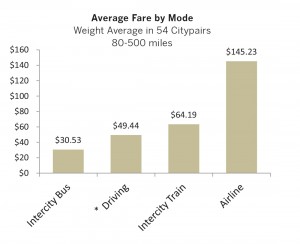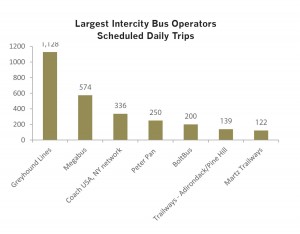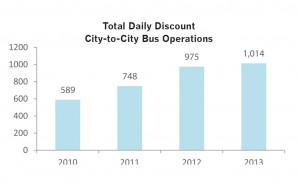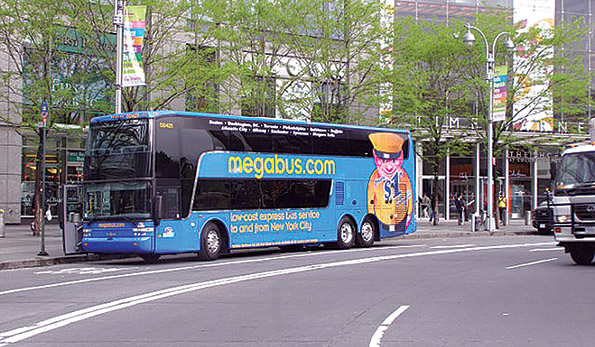
New study from DePaul University notes strides in intercity bus systems
According to the newest in-depth study by the DePaul University of Chicago Chaddick Institute, Motoring Into the Mainstream; Intercity Bus Service in the United States in 2013, intercity bus systems made important strides in 2013. In regions where intercity bus service is convenient and readily available, daily operations grew collectively by 4 percent with 0.25 percent more operators offering service.
Chaddick Institute Director Joseph P. Schwieterman presented the newest findings in January during the American Bus Association (ABA) Marketplace in Nashville, TN. The study offers the reasons, facts and figures for where and why more Americans are riding motorcoaches, while the leading carriers are enjoying sustained growth.
The Chaddick Institute tracks all 106 known scheduled service coach carriers in the United States using its Intercity Bus Database that traces conventional carriers and discount city-to-city express-oriented corporate curbside carriers operating from downtown districts.
“We’re pleased once again to work closely with DePaul University of Chicago and Professor Schwieterman on this important report.” says ABA President and CEO Peter Pantuso. “Especially interesting are the figures concerning ticket prices. They show once again that when it comes to value, motorcoach passengers can save a lot of money when traveling.”
The reports shows the average traveler saving more than $36 a ticket on riding city-to-city motorcoach carriers compared to the next-best, non-bus alternatives such as the airlines or Amtrak.
Schwieterman says perhaps the most notable industry accomplishment of the industry in 2013 was its higher number of passenger boardings and increased revenues achieved without dramatically increasing the number of daily operations. He attributes more efficient utilization of equipment, lucrative fares and greater consumer awareness of the available coach service for the favorable financial performance.
New online focus
The study suggests that public awareness and understanding of the intercity bus services is increasing as the result of more interactive tools becoming available, more aggressive marketing and advertising initiatives that bring more focus to the motorcoach industry.
The study singles out Wanderu.com, and includes New York-based startups Bustripping and NickelBus, as notable developments in 2013 that bring added visibility to intercity bus transportation. These websites allow consumers to compare prices between bus operators and directs them to book tickets on carrier websites. While these online companies grow and build their platforms Boston-based Wanderu leads this emerging technology.
The study devotes considerable space to tracking the progress of the country’s three largest express carriers — Greyhound Express, Megabus and Boltbus.
BoltBus continued its western expansion in the Pacific Northwest adding service to Albany and Eugene, OR, after a successful launch of routes in Portland, OR, Seattle, WA, and Vancouver, BC, the year before.
BoltBus moved into California in November, establishing Los Angeles – San Francisco Bay area service with stops in San Jose and Oakland.
Megabus expanded on its brand rather than adding new routes, celebrating its 25 millionth passenger in May and the 30 millionth by September. Megabus says approximately one million people per month now travel on its routes that span 33 of the 48 continental United States.
Greyhound Lines continues to invest heavily in product enhancements. The company spent much of 2013 year revitalizing its public image through its Express product, adding schedules in a number of major urban corridors.
Greyhound also dissolved its Crucero and Americanos divisions, which focused on the Latino market and absorbed these services into a core system. Express service introduced on the Los Angeles – San Diego – Tijuana route marked the end of the Crucero Direct launched in 2012. Greyhound also launched Greyhound Package Express (GPX) as a door-to-door option for scheduling package pick-ups and drop-offs using a new website.
Following the DOT shutdown of two of the oldest and largest Chinatown bus companies in the Northeast, Fung Wah Transportation and Lucky Lucky Star Bus, Yo! Bus by Greyhound quickly launched a New York to Boston route in June. The service lasted for a brief period until Lucky Star reopened in November. However, Yo! Bus appears to be interested in expanding into longer haul markets.
Regional carriers on the move
As Greyhound continued to introduce its premium express services on an ambitious timetable and Megabus reported sharp revenue gains and record passenger volumes, many other regional carriers were also on the move during 2013. The study also charted the strategic initiatives of various carriers throughout 2013.
C&J Bus Lines, NH, added a stop in Tewksbury, MA, on its existing Portsmouth to New York City service, using a 30-seat business class seating configuration.
DC2NY began offering “The Beach Bus” service to Rehoboth and Dewey Beach in Delaware from new pick-up points in New York City and Wilmington, as well its usual run from Washington, D.C.
Martz Trailways created Curbside Express Services as a variant on its existing service, operating on Wednesdays and Saturdays from select locations in the Scranton/Wilkes-Barre areas to New York City. Bieber Tourways, Kutztown, PA, discontinued its Harrisburg to New York City service, which Fullington Trailways assumed. However, Bieber’s longstanding scheduled service between the Lehigh Valley and York County and New York and Philadelphia remains unchanged.
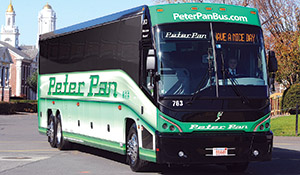
Peter Pan Bus Company announced an additional roundtrip between Boston, Providence and Hartford, CT, and Springfield, MA, as part of the BusPlus+ public and private partnership to coordinate transportation efforts throughout New England.
BoltBus Long Island changed to 7Bus after BoltBus and the franchise operator, Hampton Transportation Ventures, amicably parted ways in July. Under its own brand, 7Bus, the name denotes the starting price of one-way tickets from various points in Suffolk County to Manhattan.
RedCoach USA launched an economy class service to complement its luxury service in Florida, which features additional coach seats, lower fares and additional travel options attractive to college students. The new service is available on select days from Tallahassee and the Florida State University Gainesville campus to Miami.
Florida Express Bus, one of the state’s largest intercity bus operators announced weekend express service from Gainesville and Orlando, and to Miami on select days.
LA Swift, a low-cost intercity service that began connecting communities in Louisiana in the aftermath of Hurricane Katrina, suspended service in July, reportedly due to issues of government funding.
ACR Express, a campus-oriented operator that provided daily roundtrips between Tuscaloosa and Starkville, AL, suspended service in October.
Indian Trails initiated new service and streamlined routes with scheduled service from Bay City and Flint to Detroit, providing better connections for passengers looking to connect to other destinations. Greyhound Lines operated the service previously.
Hoosier Ride, a division of Miller Transportation, launched Chicago, IL, and Louisville, KY, service which Greyhound recently dropped, making with numerous intermediate stops that cater to college students in Bloomington and Lafayette with connections to the Greyhound system.
The FMCSA shutdown Rimrock Stages, which had operated services throughout Montana and North Dakota. Jefferson Lines picked up significant portions of its service, as did Salt Lake Express.
Flathead Transit began service between Missoula and Whitefish using funding from Montana’s state government and Greyhound. Rimrock still awaits approval to resume full operation.

